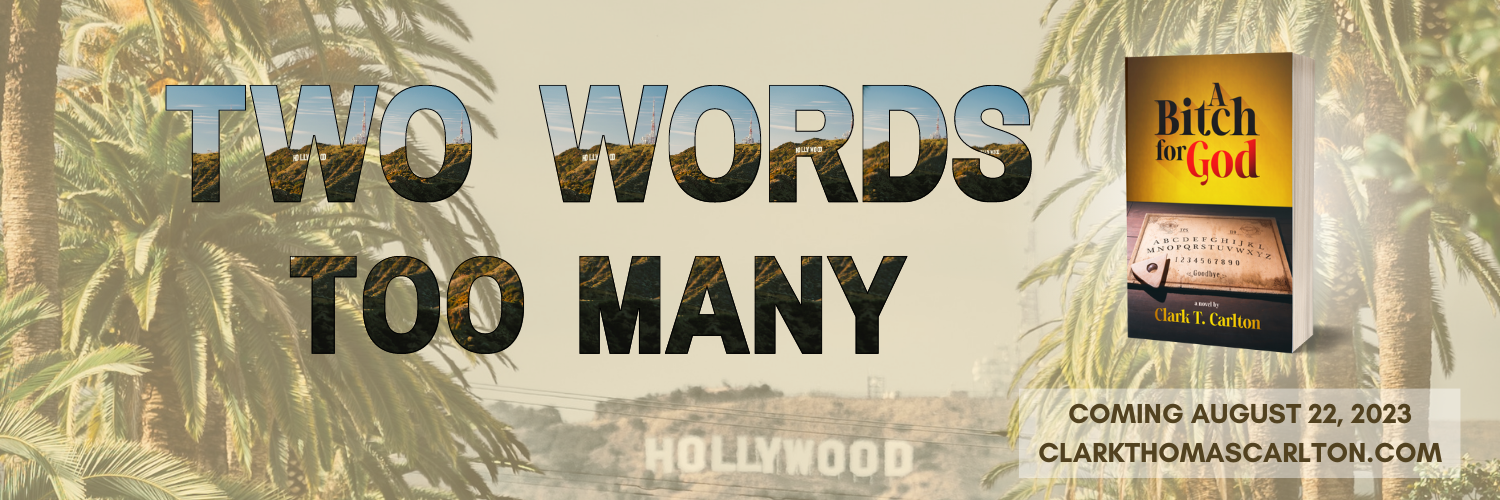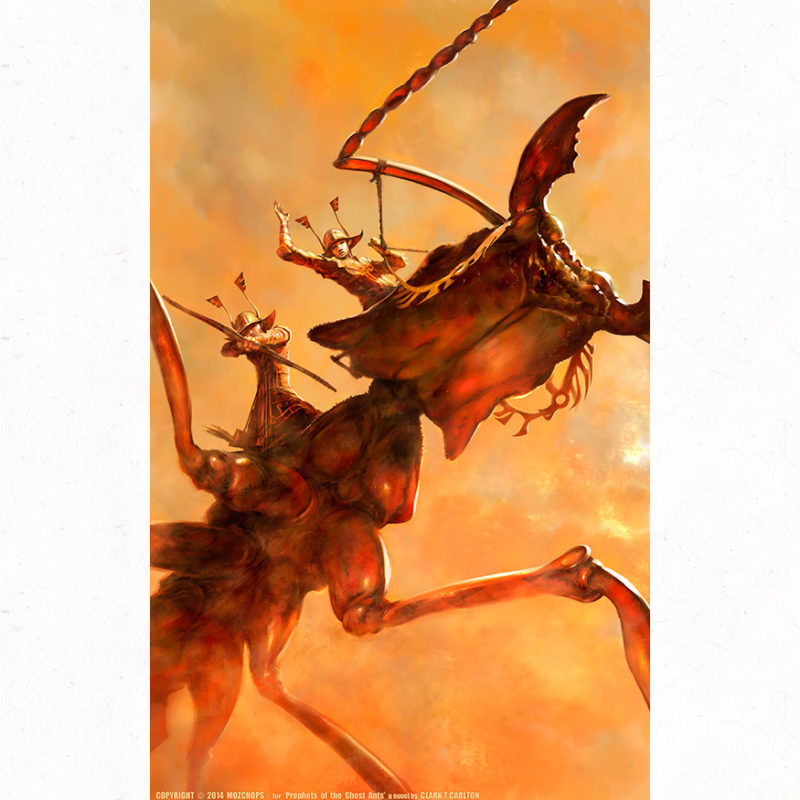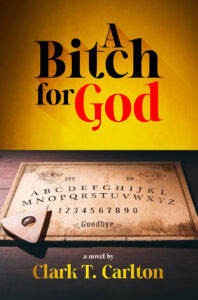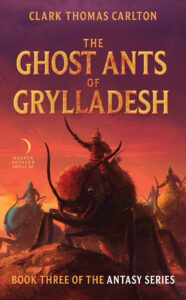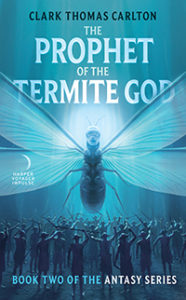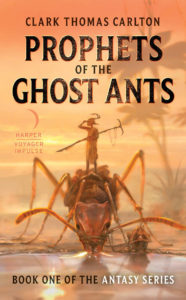This piece originally appeared as a guest blog at John Scalzi’s Whatever. Thank you, John!
The Big Idea: Clark Thomas Carlton
Yep, it came to me in a dream, the Big Idea about a far-flung future where mini-humans live as the parasites of insects.
I was exploring the Yucatan, climbing to the top of an ancient pyramid where the hearts of human sacrifices had been plucked and offered to bloodthirsty gods in return for rain and a good crop of corn. The skins of the sacrificed might be flayed and worn by Maya priests to express their piety: the equivalent of a monk’s hair shirt. The first Spaniards were appalled by this gruesome misuse of religion and then misused their own to conquer and enslave the natives.
In the place we now call Mexico, the Spanish instituted a repressive caste system similar to the one in India and the American South where a person’s status was and is still determined by skin color and race. In the face of my tour guide, I saw the brown skin of his Maya ancestors, but his mustache spoke of some Castilian blood.
Unlike the sacrificed humans, I was able to descend from the pyramid in Tulum with my heart intact. I was sipping a watermelon margarita by the hotel pool while munching on Spanish peanuts when one of them fell under my lounger. A minute later, I witnessed two different kinds of ants locked in a furious tug-of-peanut. The peanut split in two which should have provided a peaceful solution, but the ants did not stop fighting. I watched this battle until we were called to dinner.
That night I dreamed I was a captain riding into war. I was not charging from atop a horse but on a saddled black ant. From under the shade of a golden poppy, I looked over my army: thousands of tiny men, astride their own ants with bows and arrows and lances at the ready. Before us was a battlefield of massive, glistening sand grains. In the distance, our hated enemy was racing towards us on mounts of red ants. Arrows flew at us when one pierced my cheek. I tasted blood and was spitting out broken teeth when I woke with a start and realized I was safe between sheets of 400 thread count. I hastily wrote the dream down on the back of an envelope and knew it was the premise for a novel … an exciting premise. I told the dream to my partner who gave me an Uncle Milton’s Ant Farm for Christmas.
The Ant Farm brought me back to my childhood fascination with insects and ants in particular. My fourth grade teacher, Mrs. Eckhart, encouraged us to make crude ant habitats by digging up colonies with a spade and inserting them, as best we could, into a mayonnaise jar with a little bacon grease as nourishment. But I suffered as I watched these ants. Their home had been upended, and they struggled to remake their tunnels and find their way to each other. Their queen had likely been crushed or suffocated or was left behind in the wreck of her tunnels.
I chose a more humane observation of ants on a stretch of orange sand behind my house. Colonies were plentiful and black ants were building their mound just a few dangerous feet away from a mound of red ants. I tried to incite them into war by leaving bread crumbs on the sand but they ignored my provocation and kept a truce.
One morning I found the black and red tribes at war — an inevitable, territorial conflict — and it was something that lasted an entire, apocalyptic day. The ants had no weapons, but through a magnifying glass I watched in horror as they sliced each other into pieces. Their legs and severed heads were strewn across the sand. It struck me that these tiny, six legged creatures were so unlike humans and yet they were a kind of mirror.
“(The) foreign policy (of ants) can be summed up as follows: restless aggression, territorial conquest, and genocidal annihilation of neighboring colonies … if ants had nuclear weapons, they would probably end the world in a week.” That is a quote from Dr. Edward O. Wilson, the Second Darwin, the father of evolutionary biology and the world’s foremost myrmecologist. If I was going to write convincingly about tiny people living among ants, I would need to read Wilson and Holbdobbler’s The Ants, the bible of myrmecology.
I plunged myself into the study of ants. I learned they had stratified societies with a division of labor. They built functional structures with compartments that included nurseries, water storage and trash dumps. Some of them were farmers, some were raiders and slavers. And they waged wars with specialized soldier ants, the “old ladies” they sent to war, that fought together with astonishing coordination.
I avoided movies and pop-culture books about human and ant interactions. When the miniaturized children of the movie Honey, I Shrunk the Kids meet an ant, they befriend it, make it a pet and name him Antie. In reality, ants would use their antennae to sniff out the kids as ‘other’ and then flee … or attack. I learned that ants have parasites — beetles, butterflies and spiders — who can infiltrate and exploit them by replicating or stealing their colony odor. This is what my mini-humans, the extreme result of island dwarfism, would do to parasitize ants: steal their kin scent as a disguise. This would allow humans to live safely in an ant colony to harvest them as food, yoke them to labors and ride them into war.
But what about a plot?
I do not in any way encourage writers to take hallucinogenics in hopes that it will bring them a talent for invention. That just won’t happen, and there are dangers in taking unregulated drugs. But I would be lying if I didn’t admit the narrative and imagery and — most importantly — the feelings for my novel came to me on the sixth night of Burning Man.
Before the effigy went up in flames, I licked a brown splash of something off the back of my hand. Immediately, I felt as if the top of my skull had been opened with a rotary saw and the world was pouring in. Only later did I learn I’d consumed between 20 and 25 hits of acid.
Do not try this at home without the supervision of a qualified professional. Do not. LSD isn’t for everyone.
I drifted through a costumed crowd and art installations as multiple movies of what had been and might have been my life played in my head, some of them running backwards. As I dodged mutant vehicles, harsh truths erupted about myself and my own limitations as well as regrets about some Big Decisions. It was ten years of psychoanalysis in a single hour.
The stimulus of an instant city dedicated to radical self expression was too much while I was under so much influence. I wandered out to the blackness of the playa until I could no longer hear the clashing music. After taking what seemed like the longest pee of my life — the draining of the Tigris and the Euphrates — I sat and stared into a cloudy sky of turbulent ink to watch the movie that would become my book. The scenes were loosely pieced together and in need of a massive edit. What I saw was an exciting, sensuous adventure and an immersion into man’s inhumanity to man … and woman. The next two years was devoured by unraveling that vision, writing it down and then shaping and shaping and shaping it some more.
My acid trip at Burning Man was a spectacular yet joyless mega-bummer but it exposed a wealth of raw feelings I had repressed in order to function. And emerging from those feelings, I saw the journey of my flawed and wounded hero: an outcast boy who refused to accept the catastrophe of his existence.
I wanted to write a story that reminded other white, middle class Americans like me that what we have is not the norm. Most of the world does not enjoy our medicine, our schools, our electricity and our indoor toilets. Billions of human beings today would be astonished by the hundred kinds of ice cream in our local grocer’s freezer. I wanted to write about my frustration with the human tendency not to share and uplift but to horde and exclude. For so many at the top, it’s no fun to be rich if you can’t lord it over the poor.
The idea of humans living intertwined with ants allowed me to attempt a grand analogy, one that showed how both species were slaves to their instincts for war and territorial expansion. In the world of the Antasy series, humans justify the cruelties of their caste system because they see it in their ants, the order created by their gods.
The best work I’ve ever done starts with feelings and the need to express them. I’ll stop writing when I stop feeling.
The sequel to Prophets of the Ghost Ants did not come out of a dream or a chemically enhanced vision. The Prophet of the Termite God burst from my crushing disappointment in the 2016 presidential election. My alarm, sadness and depression were a strange and powerful fuel as I watched the values of fairness, inclusion and concern for all shift to exclusion, nationalism and the celebration of greed and treachery. I got no sleep that night, but for weeks afterward all I wanted to do was sleep … to sleep perchance to dream.
The dream that inspired my novel wasn’t a magic message or a gift from a god in exchange for an offering. I worked for it. Countless scientists, musicians and writers have had dreams where they received an important idea, but it was something they were already working on, something that resolved in their unconscious and emerged in a dream. I was looking for this story and doing research for it as I traveled and read about human social systems and the nature of hierarchies.
So dream big, everybody. Or, in my case, dream very, very small.

